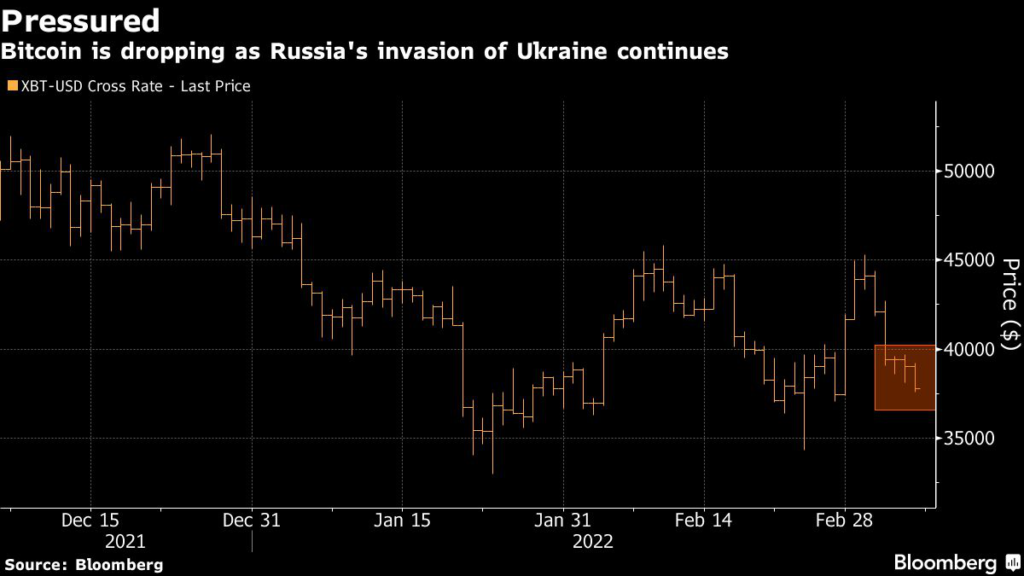(Bloomberg) — Bitcoin fell below $38,000, touching its lowest price in a week, as global markets tumbled on concerns that spiraling commodities prices unleashed by Russia’s invasion of Ukraine may have a wider and longer-lasting impact than previously thought.
The largest cryptocurrency dropped as much as 4.8% in New York trading hours. Ether, on the other hand, declined as much as 7% to trade at its lowest since Feb. 24. Other popular tokens such as Solano, Cardano and Avalanche tumbled.
Meanwhile, the S&P 500 is flirting with its worst performance of 2022, and the Nasdaq 100 dropped by 3%. Bitcoin, which has exhibited high correlations with those indices, has given up all of the gains it notched early last week, and is again trading broadly in line with other risk assets. Monday’s losses came as oil soared on concerns the U.S. and its allies might prohibit Russian oil imports.
Antoni Trenchev, co-founder and managing partner at crypto platform Nexo, says “there’s several competing narratives with Bitcoin,” referring to the digital asset’s use as an inflation hedge and as censorship-resistant. “Bitcoin is both a risk-on and a risk-off asset. It’s just that when panic occurs, there’s initial selling,” he said.
Read more: Staying Power of Crypto’s Revived Refuge Status Faces Test
For most of this year, Bitcoin had been trading sideways, failing to sustain any advances above $45,000. Edward Moya, senior market analyst at Oanda, wrote in a note on Friday that “Bitcoin’s broadening formation could see selling pressure look to test the $37,000 area.”
Meanwhile, President Joe Biden is set to sign an executive order this week that will outline the U.S. government’s strategy for cryptocurrencies, according to several people familiar with the administration’s plans.
The order will direct federal agencies to examine potential regulatory changes, as well as the national security and economic impact of digital assets, said the people, who asked not to be named discussing the deliberations. The White House’s approach to crypto has attracted fresh attention in recent weeks as Washington and its allies have levied sanctions on Russia, prompting concerns that firms and individuals there could use crypto to evade the restrictions.
With Russia’s invasion nearing the two-week mark, a debate has been raging about whether cryptocurrencies are a hedge against increasing willingness among governments to seize financial assets — or a convenient sanctions-evasion tool that needs stricter policing.
Lloyd Blankfein, the former chief executive officer of Goldman Sachs Group Inc., in a tweet late Sunday said crypto prices currently don’t appear to support the former argument.
More stories like this are available on bloomberg.com
©2022 Bloomberg L.P.











